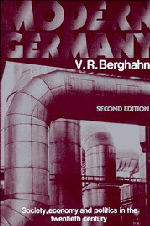Book contents
- Frontmatter
- Contents
- List of maps
- Preface
- Abbreviations
- Glossary
- 1 Wilhelmine Germany, 1900–1914
- 2 War and civil war, 1914–1923
- 3 The Weimar Republic between stabilisation and collapse, 1924–1933
- 4 The Third Reich, 1933–1945
- 5 Occupation and division, 1945–1960
- 6 The two Germanies since the 1960s
- Statistical tables
- Chronological table
- Select bibliography
- Index
1 - Wilhelmine Germany, 1900–1914
Published online by Cambridge University Press: 05 June 2012
- Frontmatter
- Contents
- List of maps
- Preface
- Abbreviations
- Glossary
- 1 Wilhelmine Germany, 1900–1914
- 2 War and civil war, 1914–1923
- 3 The Weimar Republic between stabilisation and collapse, 1924–1933
- 4 The Third Reich, 1933–1945
- 5 Occupation and division, 1945–1960
- 6 The two Germanies since the 1960s
- Statistical tables
- Chronological table
- Select bibliography
- Index
Summary
Rapid industrialisation and its impact on society
The development of modern Germany is best understood against the background of the Industrial Revolution which affected Central Europe with full force in the final decades of the nineteenth century. Britain had experienced the blessings and traumas of industrialisation earlier and more slowly, but nowhere else in Europe did the transition from an economy based on agriculture to one dominated by industry occur with the same rapidity as in Germany. Inevitably, the Industrial Revolution also had a profound effect on social structures, on the life-styles and political behaviour of people as well as on their perceptions of the world around them. These, too, changed more rapidly in Germany than in other European countries. Seen from the perspective of the late twentieth century, the links between economic, social and political transformation may seem obvious enough. While it is not easy fully to appreciate the highly dynamic situation which had developed in Germany by the turn of the century, it is nonetheless fundamental to an understanding of the subsequent course of the country's history, and this is why these changes require brief discussion here.
Although the economic, social and political factors which generated these energies must be perceived as being in constant interaction with one another, it is convenient to start with the purely economic aspects of German industrialisation. A first, very general impression of dramatic economic transformation may be obtained from a glance at the output of coal between 1880 and 1913 which rose more than fourfold and has to be set against the British figures for the same period (Table 9).
- Type
- Chapter
- Information
- Modern GermanySociety, Economy and Politics in the Twentieth Century, pp. 1 - 37Publisher: Cambridge University PressPrint publication year: 1987



